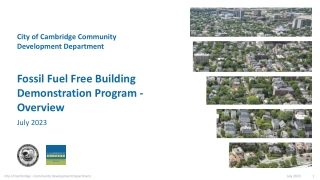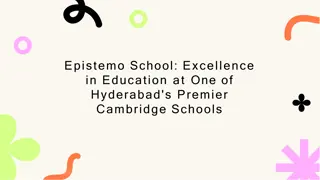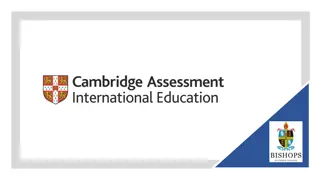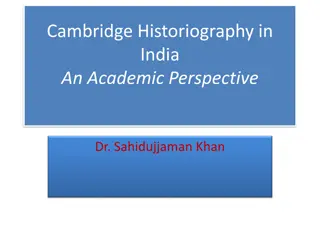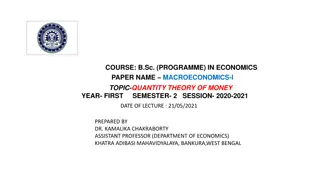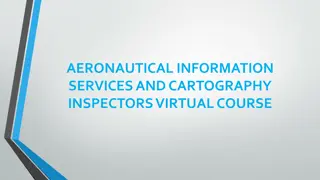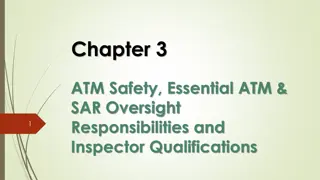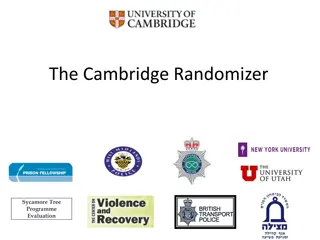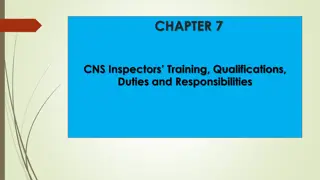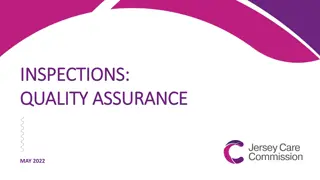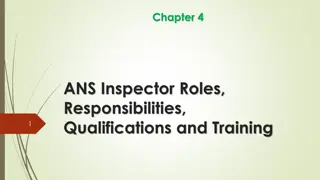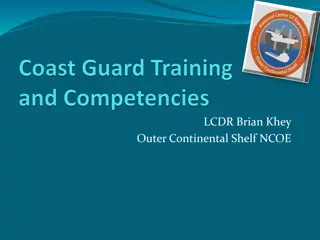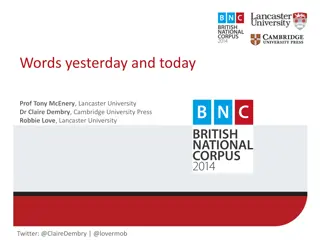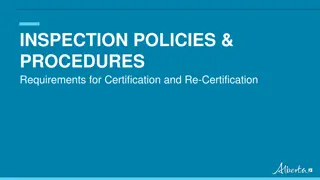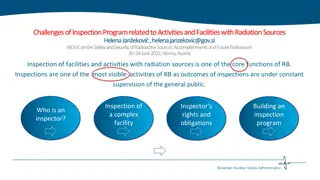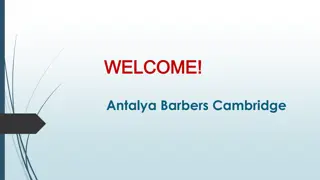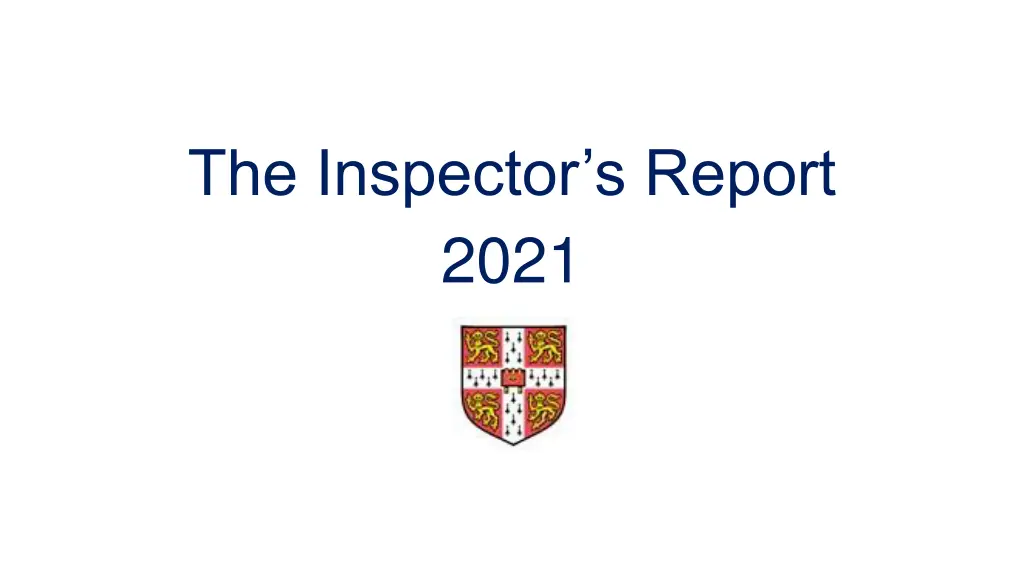
Inspector's Report 2021 Highlights
Delve into the key responsibilities of the inspector for the OIB exams, ensuring fair assessment standards and maintaining comparability with UK A-levels. Explore the inspector's role in compiling exam papers, setting mark schemes, moderating assessments, and providing advisory support to the ASIBA community. Witness the challenges faced during the 2020/2021 academic year with minimal input and training responsibilities.
Uploaded on | 0 Views
Download Presentation

Please find below an Image/Link to download the presentation.
The content on the website is provided AS IS for your information and personal use only. It may not be sold, licensed, or shared on other websites without obtaining consent from the author. If you encounter any issues during the download, it is possible that the publisher has removed the file from their server.
You are allowed to download the files provided on this website for personal or commercial use, subject to the condition that they are used lawfully. All files are the property of their respective owners.
The content on the website is provided AS IS for your information and personal use only. It may not be sold, licensed, or shared on other websites without obtaining consent from the author.
E N D
Presentation Transcript
Another Difficult Year! And one in which I ve had very little input.
A Reminder of my Role I am especially involved with the assessment of the written paper and the orals.
A Reminder of my Role I have to ensure comparability with the standards required for UK A-level in both History and Geography. I have to determine how marks in the OIB correspond to grades at A-level. This is important for university entry.
A Reminder of my Role I also have to ensure that standards are maintained year-on-year. If I do not do this, the assessment becomes unfair to the students who took exams in previous years, and possibly to students taking the exams in the future.
A Reminder of my Role So, in consultation with my French colleagues, I compile the papers (but I don t set the questions). I have responsibility for the mark schemes for the written paper and the oral exams.
A Reminder of my Role I co-ordinate and moderate the marking of the written paper. I inspect and moderate the oral examinations.
A Reminder of my Role I also have an advisory role, for example I am kept in the loop regarding any proposed changes to the syllabus. I will always provide advice and support to the ASIBA community, when required.
2020/2021 During the 2020/2021 academic year, I had very little input, apart from preparatory work for exams and orals that did not happen. I also had some training responsibilities.
2020/2021 Training Materials It is a Cambridge principle, that whenever a new syllabus is introduced, a specimen paper should be made available to the teachers of the new syllabus. This was done in autumn 2020.
2020/2021 Training Materials The good news The generic mark scheme has not really changed since 2019, so standards should be maintained. The structure of the exam paper is the same as in 2019, so preparing the students for the exam stays the same.
2020/2021 Training Materials The less good news The syllabus content has changed considerably, so teachers schemes of work had to be re-written. This impacts on the content (but not the nature) of the questions.
2020/2021 Training Materials Based on the specimen paper, our colleagues in Lyon were able to produce a number of exemplar scripts (answers to specimen paper questions). These were typed up, assessed (using the current generic mark scheme), and circulated to the community.
2020/2021 Training Materials More of these exemplar scripts can be (and will be) used in marking exercises. These marking exercises are important as they refresh our memory regarding the standard to be applied when marking written paper answers.
2020/2021 Training Materials The exemplar scripts and the marking exercises should help us to provide estimated marks for future examinations. Because the mark scheme has not really changed, the standard should be the same as in 2019.
Oral Training 2020/2021 There were two video conference meetings in Spring 2021. The main difficulty was the uncertainty surrounding what would happen to the assessment of the orals in 2021.
Oral Training 2020/2021 The first meeting was much as usual outlining the nature, processes and the marking standards of the oral exams. This meeting assumed that the orals would go ahead as usual.
Oral Training 2020/2021 The second meeting outlined contingency plans that should be put in place in case the orals might be replaced by some form of teacher assessment. This caused extra work and anxiety for all concerned. However, we had to be prepared for every eventuality.
Preparing for the orals in 2021 This can be summed up in one word Nightmare! Every possible scenario had to be considered and a plan created for each one of them.
Preparing for the orals in 2021 My thanks go to everyone involved in these discussions and preparations, but special thanks are due to Alan Geary. Alan had a detailed plan in place when the orals were cancelled at the 11thhour.
Preparing for the written paper in 2021 The usual process operated Teachers submitted questions during the autumn term. The French inspector vetted the questions and passed them on to me. We both agreed that because of the problems faced by teachers and students, the papers should be as open and wide-ranging as possible and questions should be set on mainstream topics.
Preparing for the written paper in 2021 The usual process operated I prepared six examination papers for 2021. The papers were structured in the usual way, with Sujet A and Sujet B. Question choice was as usual refer to the specimen paper.
Preparing for the written paper in 2021 The usual process operated until The exams were cancelled at the 11thhour. After that, the assessment process was in your hands and the hands of the French authorities. Quite rightly, I had no further input. However, the Cambridge inspectors were allowed to see (but not change) the marks that were awarded.
What will the future hold, in terms of assessment? We must assume that assessment will go ahead as usual in 2022, but with content based on the new syllabus. Question writing has been revised but the setting of the papers will be the same as in the past. The mark schemes will be very much the same as those used in 2019. It is the generic mark schemes that determine the standard of the assessment.
What will the future hold, in terms of assessment? So, if the mark schemes are the same as we used in 2019, it follows that the standard of marking will be the same as in 2019. This means that the percentage of students gaining marks of 10 or above (or 15 and above, or 20/20), will be similar to the percentages for those marks that obtained in 2019. This means that, in all probability, fewer students will gain high marks than in 2020 and 2021.
What will the future hold, in terms of assessment? Is this fair? It is fair on the students who took the exams in 2019. It is not fair on the students in 2022 if we compare them with the students in 2020, and especially with the students in 2021. So this brings me back to my main role the maintenance of standards, both in an absolute sense (comparability with A-level) and in a temporal sense (year-on-year).
What will the future hold, in terms of assessment? There is a similar problem in the UK. No decision has yet been reached on how to deal with it. I am sure that the French Inspectors are aware of this issue, and I look forward to working with them on how it will be resolved. Until then, we must assume that the 2019 standards will be re-instated. Teachers, students and parents need to be made aware of this.
What will the future hold, in terms of assessment? All I can currently offer as a solution, is that, as in 2021, Mme Julienne and myself will endeavour to set exam papers that are as open and wide-ranging as possible and that focus on mainstream topics. Watch this space!
Do You Have Any Questions?

